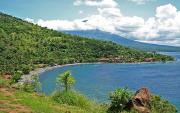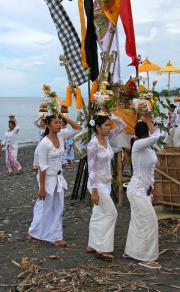Amed is a fishing village on a horseshoe bay with waters so clear that coral and fish can be seen with the naked eye. The sea is one big aquarium. The beach is of grey volcanic sand. The sea doesn't have the big waves as on the west coast.
|
 |
 |
 |
 |
 |
 |
 |
 |
Amed Village, Amed Bay and Mount Agung
 |
 |
Amed is on Bali's east coast. The nearest bigger town is Amlapura (44 km). The nearest smaller town is Culik (3 km), which is the main transport hub. It is a bit of a backwater and transport is less frequent than in other parts of Bali.
Amed proper is a small village whose inhabitants live from fishing, salt-making and tourism. In tourist language Amed is the 15 km stretch of coast from Amed via Jemeluk, Bunutan, Lipah Beach to Aas. Tourist accommodation outnumbers local accommodation, but it is all very low-key, no nightlife only sea, snorkelling and diving.
Bali gets its fair share of rain also in the dry season (April to October) but east Bali receives considerably less rain because it is in the lee of Mount Agung, Bali's highest volcano. Consequently there are fewer rice paddies and more peanut crops. Farmers still use old fashioned methods of working the land; they work their fields using wooden ploughs, harrows and teams of buffaloes.
Transport in Amed is slim. There are bemos (mini buses) from Culik as far as Aas but mainly in the morning. Later in the day it is almost impossible to find transport. The bemo (mini bus) people in Culik are only too eager to offer "special bemo". This means that they charter their bemos, and that tourists rent the bemo as private transport. The bemo people ask ridiculously high prices.
At the cross roads in Culik it is easy to board a bemo or a bus to Amlapura or Singaradja on the north coast. Here too, most transport is in the morning.
Best is to get on the bemo without asking the price. When getting off pay Rp 5000 (€ 0,40 in 2007). That should be more than enough even if the driver complains.
There are a few money changers in Amed but there is no ATM. The nearest is in Amplapura on Jalan Diponegoro at the Hardy's shopping centre.
|
|
| Favourite spots: |
Amed / Bunatan is famous for its splendid dives. One of them is to the Japanese shipwreck. Corals grow on the hull and a whole community of colourful fish live inside it. More info at http://www.jukungdivebali.com. There is a trickle of package tourists, many from France, who come on these diving trips.
The sea is crystal clear but without the big waves of Kuta and the west coast. The beach is grey volcanic sand and pebbly in places. There are no sun umbrellas no sun beds on the beach. Instead a fleet of junkungs (traditional outrigger boats) is beached in front of Amed village. Fishermen are only too willing to offer fishing trips.
Pasir Puti a white sand beach on the south coast just beyond Amlapura is the place to sunbathe and swim. There are a few warungs (small shops) who rent sunbeds and umbrellas. Massage ladies make it into a tourist place. From Amed it is only 30 min by moter bike. There is no public transport.
|
|
| What's really great: |
DAY TRIP TO AMLAPURA AND TIRTAGANGGA
Amlapura is a good place to see daily Indonesian life without (too many) tourists. The bemo ride from the cross roads in Culik took 40 mins, and dropped us at the bus / bemo station in the centre of the town. From here it is a short walk to the market, a lively affair with fruit and vegetables stalls but also household articles.
We turned left at the end of the market and found ourselves in Jalan (street) Gajahmade. There are two banks here: BRI (no ATM) and Bank Danamon (ATM, but only withdrawal of small amounts of money). Larger amounts can be withdrawn at the ATM near Hardy's supermarket
Further down, on the right is Puri Agung, the Royal palace of the last Raja (king) of the Regency (district). A red-brick entrance gateway leads to the Maskerdam building with intricately carved doors and furniture donated by Queen Wilhelmina of the Netherlands. Interesting architecture but if you have seen more palaces you can easily give it a miss.
|
|
| Sights: |
Tirtagangga Water Palace is 6 km from Amlapura (bemo from the bus station). It was built in 1948 as the bathing place and resting place for the King of the Karangasem district. A sacred spring wells up and is believed to be connected with the river Gangga in India. The spring supplies drinking water to Amlapura, it fills the swimming pools and ponds. The remainder is used to irrigate the paddy fields in the region. As the water is sacred it is also used for local ceremonies.
The most striking feature of the complex is the eleven-tiered fountain in the pond full of waterlilies. Local ceremonies are often held in the Water Palace, but not when we were there. On Sunday it is favourite outing for Indonesian tourists and the swimming pools are full of young people but on weekdays it is very quiet.
The restaurant looks out over the Water Palace, it is a breezy spot and a good place for a meal.
Lots of restoration work has been done as can be seen on http://www.tirtagangga.com/
|
|
| Accommodations: |
We stayed in Villa Sinar Cinta, a Dutch-owned Balinese-style villa. Like most Balinese houses, the villa had its own household shrine and two stone guardians to ward off unwelcoming spirits. Every day the housekeeper laid out offerings of tiny banana leaf boxes fillled with rice, flower petals and incense.
A walled garden, full of tropical flowers surrounds the villa. The veranda of the master bedroom on the first floor is one of the best places to enjoy the ocean view. Breakfast is served on the downstairs veranda and the sitting area is next to the swimmingpool. The villa can accommodate 6 – 8 persons. Separate from the main building is the a guests' house with two rooms. All this makes the villa very suitable for a family holiday.
The villa is rented with a five-member staff. Every morning we were asked what we liked for dinner. All ingredients were bought fresh from the market or the fishermen. Meals (except breakfast) are not included in the rent, but prices were reasonable
|
|
| Nightlife: |
DAY TRIP TO TENGANAN
We took a bemo to Candidasa, got off at the cross roads to Tenganan, where Ojek (motor cycles) riders offer their services, but it is only 3 km and we decided to walk. It is a scenic walk through tropical forest along a paved road.
Tenganan is famous for three things:
1. Bali Aga Village
2. Double ikat
3. Ceremonies
Bali Aga people are the original inhabitants of Bali. They speak their own dialect and live according to adat; an unwritten, traditional code governing all aspects of personal conduct from birth to death. (no marriage outside their community, no divorce, no polygamy).
The community used to live a reclusive life. All property, including the paddy field, lifestock is communal property. These days many young men are forced to work outside the village as the farming cooperative cannot provide enough work. They work in Candidasa and other tourist centres. These traditional young men ride motorbikes and have cell phones to stay in contact with employers, speak sufficient English and are excellent tourist catchers
|
|
| Hangouts: |
Visitors are welcomed at the entrance of the village by one of the young man who will act as guide. First, sign the guestbook and a leave a donation, second is a tour of the weaving workshops and a slight push to buy. They are cunning traders and it is almost impossible to bargain down to a realistic price. After the souvenir shops a tour of the village.
The village has a bizarre ceremony in which the men fight each other armed with bundles of pandan fronds - thorns facing outward – and protect themselves with circular bamboo shields. Before the fight the opponents drink tuak, very strong fermented palm wine. Music fills the air, cheers and shouts from the spectators and the fight begins. The object is to get close and scratch the opponent's body. This blood-shedding ceremony is part of an annual festival in the 5th month of the Balinese calender. The Balinese calendar consists of 210 days. Consult the events calendar for ceremonies. http://www.bali-events.com/
|
|
| Restaurants: |
The village itself has cobbled streets and people live in long-houses, built on stilts and divided into a public area on one side and private living quarters on the other. It is home to an extended family. They seem to be used mostly for shops, the people live in the small streets and further away, probably in more comfortable houses built from their tourist euros.
Tourists like to see traditional villages, locals sitting in front of their houses in sarongs, women topless as in the old days, pounding rice. The men making mud brick, or constructing new homes, all by hand no modern tools. But this is 21st century and the locals have found out that new houses are more comfortable and that tourism is a good way to earn money.
That's why souvenir selling is an important source of income. Nearly every home has a display of textiles, known as ikat, woven on back strap looms. Their speciality is double ikat. This is the link if you are interested in ikat http://en.wikipedia.org/wiki/Ikat
|
|
| Other recommendations: |
 |
 |
 |
 |
 |
 |
 |
 |
women dressed in festal garb
 |
 |
Amed is slightly touristy but Culik isn't. We liked to have our morning coffee in one of the many warungs, and while sitting on the wooden benches see the world go past True to say a very small world
As there are 20,000 temples in Bali without including the family shrines it is not difficult to find temple ceremonies. Fluttering banners on tall bamboo poles along the road show the place where a ceremony is taking place. Tourist are warmly welcomed. During our two-week stay in Amed we attended 4 ceremonies Simply don a sarong, and join in
Women dressed in festal garb carry pyramids built up of fruits and flowers, offerings for the gods. Gamalan musicians sit behind their instruments; gongs, metallophones drums and cymbals. The priest blessed the offerings and sprinkled holy water over the crowd. Incense wafted heavenward. Once the spiritual essence had been extracted, the offering lost its holiness. The ceremomy over, the devotees took the offerings home as food should not be waste
|
|
Published on Monday July 2th, 2007
|
|
 Publish on Facebook
Publish on Facebook
|
Mon, Oct 27 2008 - 05:12 AM
 by tokyomike
| Hugely informative!! Thanks. I'm heading to Bali / Indonesia for my first time in March, and I love finding out about gems like these places! Thanks. |
Thu, Aug 09 2007 - 05:05 AM
 by jorgesanchez by jorgesanchez
| erudit and complete report. an exemplar report. |
Fri, Aug 03 2007 - 10:41 PM
 by downundergal by downundergal
This is my favourite "secret" area of Bali, I love this area although it has been quite some time since I have visited and I would guess it is a lot more touristy now as there was virtually no accommodation except homestays when we were last there. Your report has made me want to pack my bags and jump on a plane.
Cheers,
Kerrie |
Wed, Jul 04 2007 - 01:54 AM
 by akhila by akhila
| Another nice one. 5* - best regards, Akhila |
Tue, Jul 03 2007 - 04:45 AM
 by mistybleu by mistybleu
Marianne, I just love the heart you put into your reports; another brilliant one.
Rgds
Amanda |
Mon, Jul 02 2007 - 08:18 PM
 by ravinderkumarsi by ravinderkumarsi
hii mari,very very nice and detailed report from you again ,and all pictures are nice and relevant.
cheers
|
Mon, Jul 02 2007 - 10:41 AM
 by eirekay by eirekay
| Marianne, this is a wonderful report! I like the idea or tourist destinations without the attendant Hard Rock Cafe or the like. Your description of the Temple ceremony is just wonderful. |
Mon, Jul 02 2007 - 07:04 AM
 by rangutan by rangutan
| Being off the major tourist tracks makes this report even more special. Photos and style excellent as usual [4.8] |
| Information: |
| Login if you are a member, or sign up for a free membership to rate this report and to earn globo points! |
|
| Latvia |
|
|
|
|
 |
| Netherlands |
|
|
|
|
|
|
|
|
|
|
 |
| Poland |
|
|
|
|
 |
| Slovakia |
|
|
 |
| Switzerland |
|
|
|
|
 |
| Tanzania, United Republic of |
|
|
|
|
|
|
|

|
